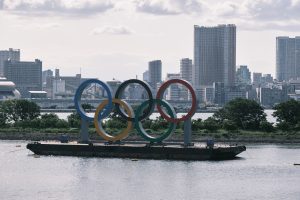
There is increasing pressure for the re-scheduled Tokyo 2020 Olympic Games to be cancelled or postponed once more, with the Covid-19 pandemic still a worldwide problem. Dr Geoff Z. Kohe, a sport management and policy expert at the School of Sport and Exercise Sciences, has commented on how even if organisers insist the Games are safe to go ahead, the moral implications must be seriously considered. Dr Kohe said:
‘Tokyo’s current predicament – in which it faces a further virus wave, mounting case and death tolls, and increased public condemnation for continuing the Games, cannot be ignored. Irrespective of assurances from Japan’s Prime Minister and the International Olympic Committee (IOC) that the event will proceed, and beyond the obvious political, legal and economic implications, organisers must consider the morality of continuation.
‘In essence, and particularly for an organisation that professes to use sport in the service of human values, it must question seriously the value it places on the lives and health of all sport workers (not just those elite athletes competing for the short Olympic Games period). It is one matter to claim to be able to test, vaccinate and protect safety for all teams and athletes (within the relative ‘safety’ of an Olympic village), yet a larger ask to extend this to ensuring the safety of all spectators and auxiliary staff that make sport mega events such as the Olympics possible.
‘It might, invariably, be possible for the IOC and Tokyo Organising Committee of the Olympic and Paralympic Games (TOCOG) to do everything in their power to ensure a ‘safe and secure’ Olympic Games. Nonetheless, as we have seen from cases of assumedly safe sport bubbles being rendered lame by athletes and their entourages testing positive, sustaining safe sport for any duration of time is a difficult and fragile enterprise. In essence, why take risks for sports’ sake? Vaccine roll-outs notwithstanding, there can be no guarantees despite organisational assurances. Statistically, with some 10,500 athletes and considerably more support staff and spectators, many attendees may, inevitably, contract the virus, and some of these may pass away as a result. That is, as we have all learned, a harsh reality of our current situation.
‘At present, at the national level there remains considerable optimism that countries will be able to field teams (even if these are slightly modified). Within the UK, the British Olympic Association (BOA), and those specifically in charge of Team GB’s currently 380-strong squad, have maintained their commitment to attending. Most contentiously, and following suggestions from leading IOC figures, there are calls now to ensure national teams could obtain the vaccine prior to attending. While BOA administrators appear quite reluctant to queue-jump, the fact that the idea is being entertained serves as a stark reminder of several key concerns: 1) that elite sport has been afforded a privileged place in society that is strengthened by assumptions of its inherent social ‘good’ and public necessity; 2) that IOC and local organising committees retain powerful capacities to influence and ensure government support for their work; and, most importantly, 3) stakeholders’ responsible for athlete welfare and organisational duties of care may need to more critically query their investments in sport for sports’ sake rhetoric.
‘There are less than 200 days before the Olympic Games commence, and the virus and its consequences will yet present further challenges to event organisers. Moreover, the IOC and Tokyo organisers will, I am sure, remain steadfast in their convictions in the face of scientific evidence, political criticism and public concern. What I suspect may transpire is a greater ground-swell of athletes, entourages, teams and officials, and even whole NOCs, deciding – at this time – their Games participation must not go on. There may only be a minority in this category, but it may enough to unsettle the Olympic Games model and prevailing questions about sport mega event sustainability and what and whose purposes sport serves.’
The University’s Press Office provides the media with expert comments in response to topical news events. Colleagues who would like to learn more about how to contribute their expertise or how the service works should contact the Press Office on 3985 or pressoffice@kent.ac.uk

Olympic Rings floating near Odaiba





